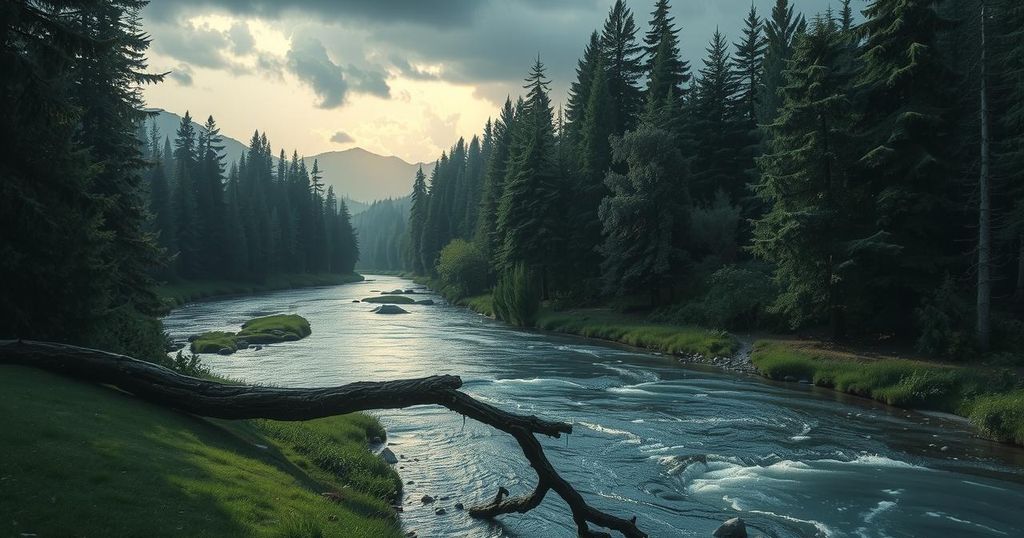The Democratic Republic of Congo faces escalating conflict as M23 rebels, allegedly backed by Rwanda, seize control of Goma. Protests in Kinshasa reflect rising tensions with accusations against Rwandan President Kagame. UN reports substantiate claims of Rwandan military oversight and advanced weaponry for M23, complicating regional dynamics. Diplomatic efforts are underway, but the situation remains unstable with significant humanitarian implications.
Protests have erupted in Kinshasa, the capital of the Democratic Republic of Congo (DRC), where demonstrators are burning images of Rwandan President Paul Kagame, alleging his support for the M23 rebels who have seized control of Goma. United Nations reports corroborate these claims, indicating a significant Rwandan military presence orchestrating M23 operations, including training and supplying advanced weaponry to the rebels.
Goma is located near the Rwandan border in the mineral-rich North Kivu province, serving as a vital trading hub and the site of the UN’s largest peacekeeping deployment. Following a resurgence of hostilities between the M23 and the Congolese army, Goma’s population has swelled, increasing the chaos amid ongoing fighting.
Jean-Pierre Lacroix, chief of UN peacekeeping, confirmed the presence of Rwandan troops in support of the M23, despite the difficulty in ascertaining their numbers. Some Congolese soldiers have reportedly surrendered by crossing into Rwanda, highlighting the conflict’s cross-border implications.
President Kagame has repeatedly denied any involvement with the M23, yet the mounting evidence has prompted a shift in rhetoric. Richard Moncrief of the International Crisis Group noted the change to a defensive justification from Rwanda, suggesting that the government is struggling to refute the evidence of support for M23.
Rwanda’s foreign ministry recently expressed escalating concerns about security threats stemming from fighting near its border. Kagame’s perspective is also informed by the historical context of the 1994 Rwandan genocide, where Hutu militias responsible for mass killings have sought refuge in the DRC, complicating Rwanda’s security calculations.
The M23, which claims to defend Tutsi interests in eastern DRC, has resurfaced since 2021 after rejecting the terms of a prior peace deal. The advancement of M23 is further fueled by accusations that DRC officials were colluding with Hutu militia groups, presenting a potential existential threat to Rwanda’s security framework.
With allegations pointing to high-level collaboration among various actors in the region, Rwanda has cited these connections as justification for military involvement. The M23 has reportedly gained power and resources through its military operations and manipulation of valuable resources such as coltan, using these to finance its campaigns.
Credible reports indicate that the M23 has been equipped with advanced military technology and weaponry, allowing it to execute sophisticated military operations against Congolese forces. The group is believed to receive extensive training in combat tactics, supported by Rwandan military personnel, despite official denials from Kigali.
The situation remains tense as ongoing diplomatic efforts, spearheaded by the East African Community, have yet to yield a resolution. Kagame’s insistence on focusing dialogue solely around the FDLR suggests a strategic imperative driven by historical grievances, emphasizing Rwanda’s enduring motivations in the regional conflict.
The regional dynamics reflect a complex interplay of security interests, humanitarian concerns, and ongoing instability, with the potential for further escalation as international observers monitor developments. Further mediation will be pivotal in addressing the root causes behind the M23’s resurgence and the associated violence.
The tensions between DR Congo and Rwanda are deeply rooted in historical events, particularly the Rwandan genocide in 1994 and the subsequent refugee crisis that saw Hutu militias retreat into the DRC. This conflict has perpetuated cycles of violence and instability in the region, complicating geopolitical relations. The M23 rebel group, which emerged from these historical conflicts, claims to advocate for the Tutsi population in the DRC but operates under contentious circumstances that often involve alleged foreign support. Recent events underscore a resurgence of fighting that threatens both local civilian populations and broader regional stability.
The conflict between DR Congo and the M23 rebels, allegedly supported by Rwanda, highlights the complex and intertwined security concerns of the region. As protests emerge in response to perceived Rwandan aggression and allegations mount against Kigali, the path forward remains fraught with tension. It is crucial for regional actors and international mediators to engage effectively to address the underlying issues and prevent further escalation of violence in eastern DR Congo.
Original Source: www.bbc.com






